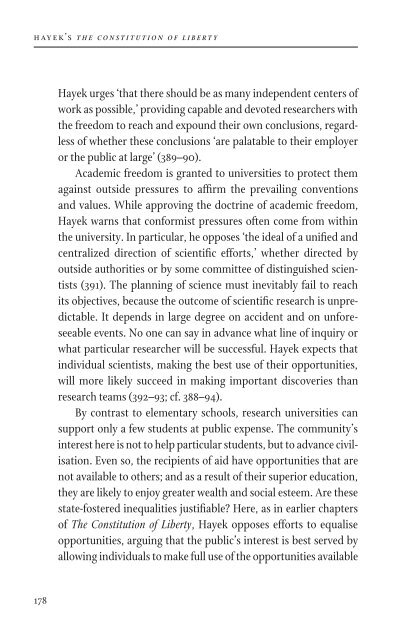Hayek's The Constitution of Liberty - Institute of Economic Affairs
Hayek's The Constitution of Liberty - Institute of Economic Affairs
Hayek's The Constitution of Liberty - Institute of Economic Affairs
Create successful ePaper yourself
Turn your PDF publications into a flip-book with our unique Google optimized e-Paper software.
h ay e k ’ s t h e c o n s t i t u t i o n o f l i b e r t y<br />
s a f e g ua r d i n g p r o g r e s s<br />
Hayek urges ‘that there should be as many independent centers <strong>of</strong><br />
work as possible,’ providing capable and devoted researchers with<br />
the freedom to reach and expound their own conclusions, regardless<br />
<strong>of</strong> whether these conclusions ‘are palatable to their employer<br />
or the public at large’ (389–90).<br />
Academic freedom is granted to universities to protect them<br />
against outside pressures to affirm the prevailing conventions<br />
and values. While approving the doctrine <strong>of</strong> academic freedom,<br />
Hayek warns that conformist pressures <strong>of</strong>ten come from within<br />
the university. In particular, he opposes ‘the ideal <strong>of</strong> a unified and<br />
centralized direction <strong>of</strong> scientific efforts,’ whether directed by<br />
outside authorities or by some committee <strong>of</strong> distinguished scientists<br />
(391). <strong>The</strong> planning <strong>of</strong> science must inevitably fail to reach<br />
its objectives, because the outcome <strong>of</strong> scientific research is unpredictable.<br />
It depends in large degree on accident and on unforeseeable<br />
events. No one can say in advance what line <strong>of</strong> inquiry or<br />
what particular researcher will be successful. Hayek expects that<br />
individual scientists, making the best use <strong>of</strong> their opportunities,<br />
will more likely succeed in making important discoveries than<br />
research teams (392–93; cf. 388–94).<br />
By contrast to elementary schools, research universities can<br />
support only a few students at public expense. <strong>The</strong> community’s<br />
interest here is not to help particular students, but to advance civilisation.<br />
Even so, the recipients <strong>of</strong> aid have opportunities that are<br />
not available to others; and as a result <strong>of</strong> their superior education,<br />
they are likely to enjoy greater wealth and social esteem. Are these<br />
state-fostered inequalities justifiable? Here, as in earlier chapters<br />
<strong>of</strong> <strong>The</strong> <strong>Constitution</strong> <strong>of</strong> <strong>Liberty</strong>, Hayek opposes efforts to equalise<br />
opportunities, arguing that the public’s interest is best served by<br />
allowing individuals to make full use <strong>of</strong> the opportunities available<br />
to them, even though these opportunities are limited to a few and<br />
inequality is the inevitable outcome (382, 385–6).<br />
Political philosophers traditionally have taught that each<br />
political regime aims to produce the type <strong>of</strong> citizen that accords<br />
with that regime; and Hayek agrees that this has been the case.<br />
He insists, however, that moulding citizens <strong>of</strong> a particular type is<br />
not the proper business <strong>of</strong> government. To do so is to presume<br />
to know what type <strong>of</strong> human being the future will prefer; but we<br />
cannot know how the future will assess man’s moral and aesthetic<br />
qualities. <strong>The</strong> solution is to encourage a variety <strong>of</strong> types. Freedom<br />
means that ‘no superior must be allowed to enforce one set <strong>of</strong><br />
views <strong>of</strong> what is right or good’ and that ‘only further experience<br />
can decide what should prevail.’ Each generation must endeavour<br />
to add its share ‘in the growth <strong>of</strong> knowledge and the gradual<br />
advance <strong>of</strong> moral and aesthetic beliefs’ (394; cf. 380).<br />
Hayek cautions against expecting too much from general<br />
enlightenment. Rationalist liberalism set out to ‘conquer ignorance,’<br />
but Hayek doubts that such a goal is feasible or that society<br />
can be improved this way: ‘<strong>The</strong>re is not much reason to believe<br />
that, if at any one time the best knowledge which some possess<br />
were made available to all, the result would be a much better<br />
society’ (376–80).<br />
Education, properly understood, views man as a being in<br />
progress or as one who ‘reaches beyond his present self.’ Education<br />
thus goes hand in hand with human freedom, whose ultimate<br />
aim ‘is the enlargement <strong>of</strong> those capacities in which man surpasses<br />
his ancestors.’ Freedom does have a purpose or aim, although its<br />
consequences are unforeseeable. Hayek concludes in this vein by<br />
quoting a well-known passage from Humboldt to the effect that<br />
liberty’s overriding aim is ‘human development in its richest<br />
178<br />
179












